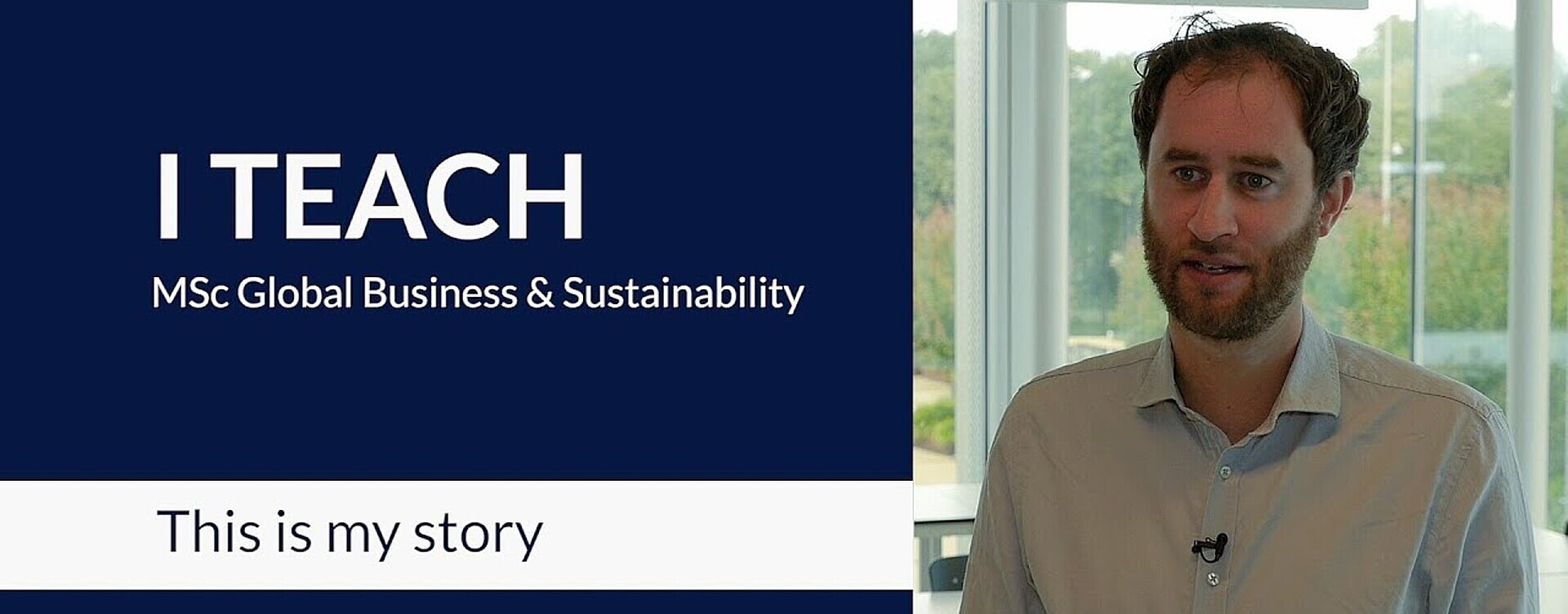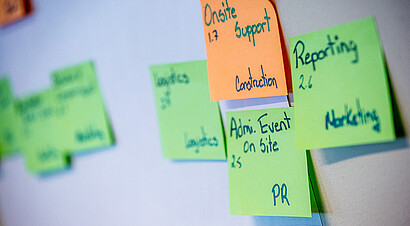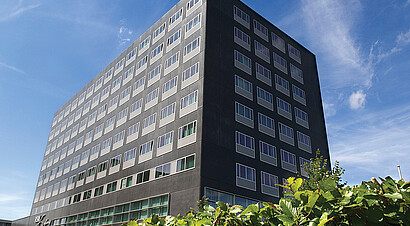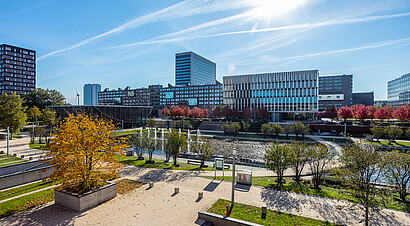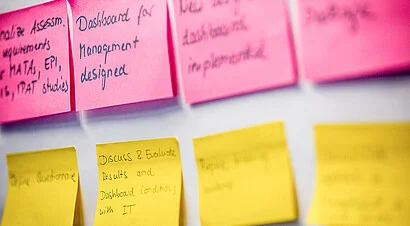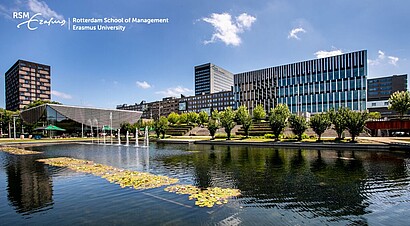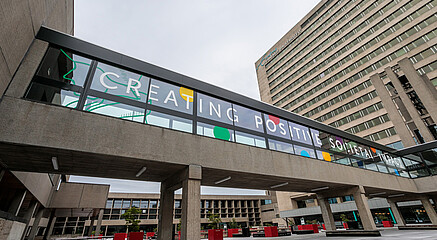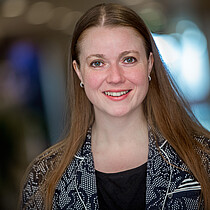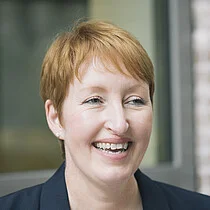Research of the Department of Business-Society Management examines the mutual impact of business and society upon each other. The broad objective is to reach a clear understanding of the challenges and opportunities arising at the interface of business and society. Strategic and sustainable solutions are the aim.
Multidisciplinary research focuses on several areas:
- The relationship between business and society: Issues around sustainability, philanthropy, international relations, reputation.
- Behavioural ethics: Issues around decision-making, ethics, leadership.
- Legitimacy: Issues around governance, stakeholder well-being, accountability, ecology.
Centres and Experts
Much of the high profile, relevant research of the B-SM Department is focused in Centres of Expertise and other projects. These centres encourage network building among scholars who are working in the many research themes of the department, providing cutting-edge research, ideas publications related to business and society management. Support for this research may come from companies, the European government, grants or sponsored Chairs.
The current Centres of Expertise associated with B-SM faculty members:
Scientific Director: Dr. Marius van Dijke
The ECBE fosters and promotes fundamental laboratory and field research in behavioural ethics that has implications for a wide variety of fields such as management, law, and social sciences in general.
Director: Marijke Baumann
This Centre is focused on corporate communication as a management instrument that harmonises all consciously used forms of internal and external communication as effectively and efficiently as possible in order to achieve a positive corporate reputation.
Scientific Director: Dr. Steve Kennedy
The broad aim of this Centre is to reach a clearer understanding of the management challenges posed by climate change and search for credible management solutions to achieving global sustainability.
Academic Director: Prof. dr. Rob van Tulder
The PrC is a flexible learning and research network; it functions as the centre of a (virtual) network of professionals, academics and practitioners around the world to share, retrieve and build up knowledge and experience to enhance the impact of cross sector partnerships on addressing complex or ‘wicked’ problems in particular around sustainable development. The latter entails processes of selecting appropriate partnerships and increasing their efficiency, impact and effectiveness.
-
De Moor, T. (2025). Review of A. Winchester (2024). Common Land in Britain: A History from the Middle Ages to the Present Day. Economic History Review, 78(1), 333-334. https://doi.org/10.1111/ehr.13400
-
Schippers, M., van Tulder, R., Louwerse, M. M., & Panas, D. C. (2025). Engaging Students with Sustainable Development Goals: A Performative Educational Toolkit with Virtual Reality Simulations, Letters to the Future and an SDG Strategy Assignment. Erasmus University Rotterdam (EUR).
-
Jansen, M. (2025). Ports as a force for positive change? An ecosystems approach to inclusive port development. [Doctoral Thesis, Erasmus University Rotterdam]. Erasmus University Rotterdam (EUR).
-
Bauwens, T., & Wade, R. (2025). Unpacking the Energy Commons. In Postcapitalist Countrysides: From commoning to community wealth building (pp. 327-351). UCL Press.
-
Cetera, G. E., Punzi, M. C., Merli, C. E. M., & Vercellini, P. (2025). Analyzing the association between menstrual coitus and endometriosis' pathogenesis: A narrative review. Women's health (London, England), 21. Advance online publication. https://doi.org/10.1177/17455057241305072
-
Takkenberg, J. J. M., Kluin, J., & Deglurkar, I. (2025). Cardiac surgery needs women: innovation through inclusion. European Journal of Cardio-thoracic Surgery, 67(2), Article ezaf032. https://doi.org/10.1093/ejcts/ezaf032
-
Zisopoulos, F. K., Fath, B., Toboso Chavero, S., Huang, H., Schraven, D., Steuer, B., Stefanakis, A., Clark, O. G., Scrieciu, S., Singh, S. J., Noll, D., & de Jong, M. (2025). Inequities blocking the path to circular economies: A bio-inspired network-based approach for assessing the sustainability of the global trade of waste metals. Resources, Conservation and Recycling, 212, Article 107958. https://doi.org/10.1016/j.resconrec.2024.107958
-
Zisopoulos, F. K., Fath, B. D., Tong, X., & de Jong, M. (2025). Network properties of the global waste trade. Environmental and Sustainability Indicators, 25, Article 100550. https://doi.org/10.1016/j.indic.2024.100550
-
Zisopoulos, F. K., Fath, B. D., de Oliveira, B. M., Toboso-Chavero, S., D'Assenza-David, H., de Souza, V. M., Huang, H., Scrieciu, Ş., Clark, O. G., Noll, D., Singh, S., Stefanakis, A., Boyd, G., Schraven, D., & de Jong, M. (2025). Towards an ecological metaphor for regenerative circular economies. Ecological Economics, 231, Article 108545. https://doi.org/10.1016/j.ecolecon.2025.108545
-
Wang, X., Notenboom, M. L., Veen, K. M., Grashuis, P., Andrinopoulou, E. R., Etnel, J. R. G., Bogers, A. J. J. C., Mokhles, M. M., & Takkenberg, J. J. M. (Accepted/In press). How to Put Survival After Cardiothoracic Interventions in the General Population Context: A Case-Based Practical Guideline to Calculate Cumulative Matched-General-Population Survival. Circulation: Cardiovascular Quality and Outcomes, Article e009993. https://doi.org/10.1161/circoutcomes.123.009993
-
van Zanten, J. A., & Putintseva, M. (2025). Evaluating governmental policies for the sustainable development goals using hierarchical clustering. International Journal of Sustainable Development and World Ecology. Advance online publication. https://doi.org/10.1080/13504509.2024.2448669
-
Stofberg, N., Ciulli, F., Bridoux, F., & Hawlitschek, F. (2025). Value co-creation in sharing service ecosystems: The role of institutional arrangements and social norms. Journal of Cleaner Production, 492, Article 144663. https://doi.org/10.1016/j.jclepro.2025.144663
-
Punzi, M. C., & Thuis, T. (2025). Mapping ethical concerns in algorithm-driven period and fertility tracking technologies. Contraception, Article 110837. Advance online publication. https://doi.org/10.1016/j.contraception.2025.110837
-
Petrovics, D., & Savini, F. (2025). Energy communities for degrowth: Democracy, reduction, maintenance and substitution. Energy Research and Social Science, 121, Article 103946. https://doi.org/10.1016/j.erss.2025.103946
-
Notenboom, M. L., de Keijzer, A. R., Veen, K. M., Gokalp, A., Bogers, A. J. J. C., Heijmen, R. H., van Kimmenade, R. R. J., Geuzebroek, G. S. C., Mokhles, M. M., Bekkers, J. A., Roos-Hesselink, J. W., & Takkenberg, J. J. M. (2025). Sex-related differences in the clinical course of aortic root and ascending aortic aneurysms: the DisSEXion Study. European Heart Journal, 46(6), 551-564. Article ehae525. https://doi.org/10.1093/eurheartj/ehae525
-
Dong, Y., de Jong, M., Wang, J., & Yu, N. (2025). The asymmetric impacts of governmental grant funding and block funding on research quality in Chinese universities. International Journal of Educational Research, 130, Article 102552. Advance online publication. https://doi.org/10.1016/j.ijer.2025.102552
-
Biscaro, C., Bruni, E., Cornelissen, J., & Oswick, C. (Accepted/In press). Metaphor and Organization Studies: Going beyond resonance to further theory and practice. Organization Studies. https://doi.org/10.1177/01708406251314572
-
Kaptein, M. (2024). Normatively reconciling shareholder and stakeholder theories: The ethical responsibility of a business is serving its owners by serving its stakeholders. https://doi.org/10.2139/ssrn.4659249
-
Kaptein, M. (2024). Research Handbook on Organisational Integrity. Edward Elgar Publishing. https://doi.org/10.4337/9781803927930
-
Augustine, G., Lodge, J., & Radic, M. (2024). Mr Bates vs The Post Office depicts one of the UK’s worst miscarriages of justice: here’s why so many victims didn’t speak out. Web publication/site, The Conversation. https://theconversation.com/mr-bates-vs-the-post-office-depicts-one-of-the-uks-worst-miscarriages-of-justice-heres-why-so-many-victims-didnt-speak-out-220513
-
Touburg, G. (2024). Mobilizing Myth in Management: A Literature Review. 15th International Conference on Organizational Discourse, Bristol, United Kingdom. https://www.researchgate.net/publication/381927178_Mobilizing_Myth_in_Management_Theory_A_Literature_Review
-
Touburg, G. (2024). Mythologizing Management through Metaphor in Business Teaching Cases. 15th International Conference on Organizational Discourse, Bristol, United Kingdom. https://www.researchgate.net/publication/381927187_Mythologizing_Management_through_Metaphor_in_Business_Teaching_Cases
-
Petrovics, D. (2024). The Institutionalization of Energy Communities for a Just and Democratic Energy Transition. Multistakeholder Forum on Science, Technology and Innovation for the Sustainable Development Goals. https://sdgs.un.org/tfm/STIForum2024#science-policy_briefs
-
Ouacha, M. (2024). Film Review. The Football Aficionado. Directed by Sharmin Mojtahedzadeh and Paliz Khoshdel. Urbanities, 14(2). https://www.anthrojournal-urbanities.com/vol-14-no-2-november-2024/
-
Ferwerda, W. (2024). Commonland's 4 Returns: A Path to Sustainable Landscapes, with Willem Ferwerda. Digital or Visual Products, Designing Nature's Half. https://www.designingnatureshalf.com/the-landscape-conservation-podcast/commonland-4-returns-framework-willem-ferwerda
-
Ferwerda, W. (2024). Episode 10: Landscape Scale Regeneration: 100 MM Hectares by 2024!. Digital or Visual Products, CapInstitute. https://youtu.be/JC1BtaSfLR4
-
Ferwerda, W. (2024). Kickstarted the restoration industry with Commonland 11 years ago, now finally big money shows interest, but we need billions. Digital or Visual Products https://investinginregenerativeagriculture.com/2024/08/13/willem-ferweda/
-
van Overbeeke, P. (2024). Appreciating what matters: The many dimensions of volunteer value. [Doctoral Thesis, Erasmus University Rotterdam]. Erasmus University Rotterdam (EUR).
-
Sadiq, M. (2024). Hybrid pathways to societal impact: Challenges and opportunities. [Doctoral Thesis, Erasmus University Rotterdam]. Erasmus University Rotterdam (EUR).
-
Ouacha, M. (2024). Receiving by giving: The examining of cross-border diasporic and bi-cultural philanthropy. [Doctoral Thesis, Erasmus University Rotterdam]. Erasmus University Rotterdam (EUR).
-
Jellema, S. (2024). Brace for impact: Good intentions, unintended consequences, and the role of performative micro-processes in organized eff orts for societal change. [Doctoral Thesis, Erasmus University Rotterdam]. Erasmus University Rotterdam (EUR).
-
De Schutter, L. (2024). How power differences shape interpersonal trust processes. [Doctoral Thesis, Erasmus University Rotterdam]. Erasmus University Rotterdam (EUR).
-
Casoliva- i- Cabana, G. (2024). Unravelling Team Ethical Culture: The Existence, Relevance and Implications for Ethics Management. [Doctoral Thesis, Erasmus University Rotterdam]. Erasmus University Rotterdam (EUR).
-
Bunders, D. (2024). Gigs of their own: can platform cooperatives become resilient? [Doctoral Thesis, Erasmus University Rotterdam]. Erasmus University Rotterdam (EUR).
-
Vugts, B. (Ed.), Holwerda, M. (Ed.), de Vries, S. (Ed.), van Raak, R., Adriaansen, R.-J., Boele, C., van de Bovenkamp, H., Gerritsen, H., Grim, R., Haandrikman, F., Icaza, R., Jones, L., Koot, R., Kruithof, F., van Leeuwen, P., Plaatsman, P., Platenkamp, C., van der Ploeg, E., Schelling, J., ... Vugts, B. (2024). The living library: Stories from the collections of the Erasmus University Library. Erasmus University Rotterdam (EUR).
-
De Moor, T. (2024). Hoe waarde weerbaar wordt: Bouwen aan de gemeenschapseconomie in Rotterdam. https://www.collectievekracht.eu/collectievenlab/nieuws/2725217.aspx?t=Hoe-waarde-weerbaar-wordt-bouwen-aan-de-gemeenschapseconomie-in-Rotterdam
-
Commonland (2024). The 4 Returns Framework in Practice: A guidebook for holistic landscape restoration. https://4returns.commonland.com/lesson/introduction/
-
van Tulder, R., Grøgaard, B., & Lunnan, R. (2024). Introduction : Settting the scene. In Walking the Talk? : MNEs Transitioning Towards a Sustainable World Progress in International Business Research (Vol. 18, pp. 1-15) https://doi.org/10.1108/S1745-886220240000018001
-
Takkenberg, H. (2024). You can't be what you can't see / Wat je niet kent dat word je niet: Reflections on the continued overrepresentation of male professors in the Netherlands / Beschouwingen over de aanhoudende oververtegenwoordiging van mannelijke hoogleraren in Nederland. In The living library / De levende bibliotheek: Stories from the collections of the Erasmus University Library / Verhalen uit de collecties van de Erasmus Universiteitsbibliotheek (pp. 166-179). Erasmus University Rotterdam (EUR).
-
de Bree, M., & Stoopendaal, A. (2024). A regulatory perspective on organizational integrity. In Handbook of organizational integrity (pp. 243-256). Edward Elgar Publishing. https://doi.org/10.4337/9781803927930
-
Cornelissen, J. (2024). Defining the role of metaphor in organization studies. In The Oxford Handbook of Metaphor in Organization Studies (pp. 43-56). Ithaca/Oxford University Press. https://doi.org/10.1093/oxfordhb/9780192895707.013.2
-
Berens, G. (2024). Organizational Trust. In K. Podnar (Ed.), Elgar Encyclopedia of Corporate Communication (pp. 450-453). Edward Elgar Publishing. https://doi.org/10.4337/9781802200874.ch73
-
Augustine, G., Lodge, J., & Radic, M. (2024). From paralysis to publicization: How victims confront organizational harm. Academy of Management Annual Meeting Proceedings, 2024(1). https://doi.org/10.5465/AMPROC.2024.315bp
-
Yacoub, M. H., Notenboom, M. L., Melina, G., & Takkenberg, J. J. M. (2024). Surgical Heritage: You Had to Be There, Ross: The Comeback Kid. Seminars in Thoracic and Cardiovascular Surgery: Pediatric Cardiac Surgery Annual, 27, 37-41. https://doi.org/10.1053/j.pcsu.2023.10.001
-
Notenboom, M. L., Van Hoof, L., Schuermans, A., Takkenberg, J. J. M., Rega, F. R., & Taverne, Y. J. H. J. (2024). Aortic Valve Embryology, Mechanobiology, and Second Messenger Pathways: Implications for Clinical Practice. Journal of Cardiovascular Development and Disease, 11(2), Article 49. https://doi.org/10.3390/jcdd11020049
-
Cetera, G. E., Punzi, M. C., Merli, C. E. M., & Vercellini, P. (2024). Menstrual products: culprits or bystanders in endometriosis and adenomyosis pathogenesis? Archives of Gynecology and Obstetrics, 310(4), 1823-1829. Advance online publication. https://doi.org/10.1007/s00404-024-07713-w
-
Biermann, K. Y., Breitsohl, H., & Meijs, L. C. P. M. (2024). Occupation-Related Volunteering: A Qualitative Systematic Literature Review, Conceptualization, and Directions for Future Research. SAGE Open, 14(2). https://doi.org/10.1177/21582440241255834
-
Bauwens, T., Wade, R., & Burke, M. (2024). The energy commons: A systematic review, paradoxes, and ways forward. Energy Research and Social Science, 118, Article 103776. https://doi.org/10.1016/j.erss.2024.103776
-
Cornelissen, J., Höllerer, M. A., Boxenbaum, E., Faraj, S., & Gehman, J. (2024). Large Language Models and the Future of Organization Theory. Organization Theory, 5(1). https://doi.org/10.1177/26317877241239056
-
Biely, K., Sareen, S., de Vries, G., Chappin, E., Bauwens, T., & Montagnino, F. M. (2024). Understanding the embeddedness of individuals within the larger system to support energy transition. Sustainability Science, 19(3), 687-700. https://doi.org/10.1007/s11625-024-01493-7
-
Zhu, J., Gianoli, A., Noori, N., de Jong, M., & Edelenbos, J. (2024). How different can smart cities be? A typology of smart cities in China. Cities, 149, Article 104992. https://doi.org/10.1016/j.cities.2024.104992
-
Zhu, B., Guo, J., de Jong, M., Liu, Y., Zhao, E., & Jing, G. (2024). Predicting city branding choices made by Chinese metropolitan cities: examining the impact of geographic context and national plans. Journal of Place Management and Development, 17(3), 295-324. https://doi.org/10.1108/JPMD-04-2023-0042
-
Zhao, R., Edelenbos, J., & de Jong, M. (2024). Between branding and being: how are inclusive city branding and inclusive city practices related? Journal of Place Management and Development, 18(1), 20-39. https://doi.org/10.1108/JPMD-11-2023-0113
-
Yu, N., Dong, Y., de Jong, M., & Yue, J. (2024). How do new university presidents affect research performance? Measuring the impact of pervious career paths in China. Research Policy, 53(2), Article 104946. https://doi.org/10.1016/j.respol.2023.104946
-
Xu, C., Huo, X., Hong, Y., Yu, C., de Jong, M., & Cheng, B. (2024). How urban greening policy affects urban ecological resilience: Quasi-natural experimental evidence from three megacity clusters in China. Journal of Cleaner Production, 452, Article 142233. https://doi.org/10.1016/j.jclepro.2024.142233
-
Wittenberg, K., Corten, R., van der Lippe, T., & de Moor, T. (2024). The emergence of citizen collectives for care: the role of social cohesion. BMC Public Health, 24(1), Article 3360. https://doi.org/10.1186/s12889-024-20780-7
-
Williams, A., Parker, J. N., Kennedy, S., & Whiteman, G. (2024). A Process Study of Evolving Paradoxes and Cross-Sector Goals: A Partnership to Accelerate Global Sustainability. Journal of Management. Advance online publication. https://doi.org/10.1177/01492063241278803
-
Werner, M. D., Punzi, M. C., & Turkenburg, A. J. K. (2024). Period Power: Organizational Stigma, Multimodality, and Social Entrepreneurship in the Menstrual Products Industry. Journal of Management Studies, 61(5), 2137-2180. https://doi.org/10.1111/joms.12974
-
Versteegt, L., van Dijke, M., & van den Bos, K. (2024). Physical distancing during the COVID-19 crisis: The roles of threat and moralization. Journal of Applied Social Psychology, 54(3), 162-174. https://doi.org/10.1111/jasp.13021
-
Velasco-Herrejón, P., & Bauwens, T. (2024). Are energy transitions reproducing inequalities? Power, social stigma and distributive (in)justice in Mexico. Global Environmental Change, 87, Article 102883. https://doi.org/10.1016/j.gloenvcha.2024.102883
-
Veen, K. M., Koudstaal, T., Hendriks, P. M., Takkenberg, J. JM., Boomars, K. A., & van den Bosch, A. E. (2024). Prognostic value of tricuspid valve regurgitation in patients with pulmonary arterial hypertension and CTEPH: A longitudinal study. IJC Heart and Vasculature, 51, Article 101342. https://doi.org/10.1016/j.ijcha.2024.101342
-
van Oorschot, I., Touburg, G., Strelkov, A., & Jacobs, G. (2024). Grounds for Cooperation in the Radicalisation Governance Milieu? A Qualitative Exploration of Stakeholder Issue Frames of Online Radicalisation. Perspectives on Terrorism, 18(3), 135-151. https://doi.org/10.19165/2024.7550
-
van Klingeren, F., & De Moor, T. (2024). Ecological, financial, social and societal motives for cooperative energy prosumerism: measuring preference heterogeneity in a Belgian energy cooperative. Energy, Sustainability and Society, 14(1), Article 13. https://doi.org/10.1186/s13705-024-00444-5
-
van Klingeren, F., & Buskens, V. (2024). Graduated sanctioning, endogenous institutions and sustainable cooperation in common-pool resources: An experimental test. Rationality and Society, 36(2), 183-229. https://doi.org/10.1177/10434631231219608
-
van Dijke, M., Guo, Y., Wildschut, T., & Sedikides, C. (2024). Perceived Organizational Change Strengthens Organizational Commitment and Organizational Citizenship Behavior via Increased Organizational Nostalgia. Journal of Applied Psychology, 110(1), 89-106. https://doi.org/10.1037/apl0001221
-
van der Straaten, K., Pisani, N., & Kolk, A. (2024). Parenthood wage gaps in multinational enterprises. Journal of International Business Studies, 55(6), 805-815. Advance online publication. https://doi.org/10.1057/s41267-024-00691-w
-
Untereiner, E., Toboso-Chavero, S., Fariñas, A. V., Madrid-Lopez, C., Villalba, G., & Durany, X. G. (2024). Predicting willingness to pay and implement different rooftop strategies to characterize social perception of climate change mitigation and adaptation. Environmental Research Communications, 6(1), Article 015004. https://doi.org/10.1088/2515-7620/ad1b65
-
Syakhroza, M. A., & Lodge, J. (2024). Birds of a Feather are Punished Together, or Not? Examining Heterogeneity in Career Advancements of Minority Groups. Journal of Management Studies, 62(2), 879-922. Advance online publication. https://doi.org/10.1111/joms.13077
-
Song, Y., de Jong, M., Yang, W., Wang, B., & Stead, D. (2024). Dreaming the wrong dream: An exploratory case study of a policy change toward sustainable urban development in a medium-sized Chinese city. Journal of Urban Affairs, 46(2), 252-266. https://doi.org/10.1080/07352166.2022.2059377
-
Solinger, O. N., Heusinkveld, S., & Cornelissen, J. P. (2024). Redefining concepts to build theory: A repertoire for conceptual innovation. Human Resource Management Review, 34(1), Article 100988. https://doi.org/10.1016/j.hrmr.2023.100988
-
Sha, K., Taeihagh, A., & De Jong, M. (2024). Governing disruptive technologies for inclusive development in cities: A systematic literature review. Technological Forecasting and Social Change, 203, Article 123382. https://doi.org/10.1016/j.techfore.2024.123382
-
Roncancio Marin, J., & Guerrero, M. (2024). University technology transfer offices' capabilities in responding to societal challenges: lessons from an exploratory study during the COVID-19 pandemic. The Journal of Technology Transfer, 49(6), 2135-2158. Advance online publication. https://doi.org/10.1007/s10961-024-10120-7
-
Reshef, R., & Gutschow, M. (2024). Text Recognition Model for Yiddish in Vaybertaytsh Typeface, Based on Community Regulations. Journal of Open Humanities Data, 10, 1-10. Article 35. https://doi.org/10.5334/johd.194
-
Petrovics, D., Huitema, D., Giezen, M., & Vis, B. (2024). Scaling mechanisms of energy communities: A comparison of 28 initiatives. Global Environmental Change, 84, Article 102780. https://doi.org/10.1016/j.gloenvcha.2023.102780
-
Peeters, D. (2024). Special Call: Qualitative research proposals. Journal of management.
-
Ouacha, M., Meijs, L., & Biekart, K. (Accepted/In press). Diasporic Philanthropy and the Sense of Belonging as an Expression of Diasporic Cultural Identity and Inclusion. Voluntas, 35(6), 1081-1090. https://doi.org/10.1007/s11266-024-00674-3
-
Oswick, C., Biscaro, C., Bruni, E., & Cornelissen, J. (2024). RECONCEPTUALIZING CONCEPTUAL ENGINEERING. Academy of Management Review, 49(2), 429-431. https://doi.org/10.5465/amr.2021.0031
-
Morell-Delgado, G., Talens Peiró, L., & Toboso-Chavero, S. (2024). Revealing the management of municipal textile waste and citizen practices: The case of Catalonia. Science of the Total Environment, 907, Article 168093. https://doi.org/10.1016/j.scitotenv.2023.168093
-
Mato-Santiso, V., Rey Garcia, M., Meijs, L., & Krasnopolskaya, I. (2024). You never can say ‘goodbye’: valuing and enhancing episodic re-volunteering. Voluntary Sector Review, 15(3), 453-477. https://doi.org/10.1332/204080521X16895878077994
-
Marti, E., Lawrence, T. B., & Steele, C. W. J. (2024). Constructing Envelopes: How Institutional Custodians Can Tame Disruptive Algorithms. Academy of Management Journal, 67(5), 1273-1301. https://doi.org/10.5465/amj.2019.1343
-
Lluma Trujillo, A., Meijs, L. C. P. M., & Berens, G. (2024). Characteristics and Motivations of Environmental Volunteers at Episodic Events. Environmental Education Research, 30(8), 1368-1384. Advance online publication. https://doi.org/10.1080/13504622.2024.2360558
-
Liu, X., Schraven, D., Ma, W., de Jong, M., & Hertogh, M. (2024). Achieving a framework of the circular economy in urban transport infrastructure projects: a meso-scale perspective. Frontiers in Sustainability, 5, Article 1475155. https://doi.org/10.3389/frsus.2024.1475155
-
Leunissen, J. M., van Dijke, M., Wildschut, T., & Sedikides, C. (2024). Organizational Nostalgia: The Construct, the Scale and its Implications for Organizational Functioning. British Journal of Management, 35(2), 816-838. https://doi.org/10.1111/1467-8551.12740
-
Lashitew, A. A., Branzei, O., & van Tulder, R. (2024). Community Inclusion under Systemic Inequality: How For-Profit Businesses Pursue Social Purpose. Journal of Management Studies, 61(1), 230-268. https://doi.org/10.1111/joms.12907
-
Lam, H., Giessner, S. R., Shemla, M., & Werner, M. D. (2024). Leader and leadership loneliness: A review-based critique and path to future research. Leadership Quarterly, 35(3), Article 101780. Advance online publication. https://doi.org/10.1016/j.leaqua.2024.101780
-
Kellner, E., Petrovics, D., & Huitema, D. (2024). Polycentric Climate Governance: The State, Local Action, Democratic Preferences, and Power—Emerging Insights and a Research Agenda •. Global Environmental Politics, 24(3), 24-47. https://doi.org/10.1162/glep_a_00753
-
Kaptein, M. (2024). A Profit Cap is not yet a General Moral Duty for Companies: A Corporate Social Contract Perspective. Journal of Business Ethics. https://doi.org/10.1007/s10551-024-05834-5
-
Jones, G. G., Lopes, T. D. S., Pananond, P., van Tulder, R., Sinkovics, N., & Sinkovics, R. R. (2024). Transitioning from responsible and reactive to deeply responsible and proactive international business. Critical Perspectives on International Business, 21(2), 196-225. https://doi.org/10.1108/cpoib-08-2024-0092
-
Horner, S., Cornelissen, J., & Zundel, M. (2024). Panacea or Dangerous Practice: A Counterpoint to Hanisch's Argument for Prescriptive Theorizing. Journal of Management Studies, 61(4), 1717-1730. https://doi.org/10.1111/joms.13039
-
Hoedemakers, J., de Bruin Cardoso, I., van Overbeeke, P., & Meijs, L. (2024). Instead of with a rowboat, search for the north star by navigating a sailboat through turbulent times. Journal of Philanthropy and Marketing, 29(3), Article e1873. https://doi.org/10.1002/nvsm.1873
-
Herrmann, A. M., Polzin, F., Held, L., & Dimov, D. (2024). Follow the money: funding acquisition processes of nascent ventures. Entrepreneurship and Regional Development, 36(3-4), 341-365. Advance online publication. https://doi.org/10.1080/08985626.2023.2298997
-
Geskus, S., Punt, M. B., Bauwens, T., Corten, R., & Frenken, K. (2024). Does social capital foster renewable energy cooperatives? Journal of Economic Geography, 24(6), 887-905. https://doi.org/10.1093/jeg/lbae031
-
Gaara, A., Kaptein, M., & Berens, G. (2024). It is all in the name: Toward a typology of public relations professionals' ethical dilemmas. Public Relations Review, 50(1), Article 102418. https://doi.org/10.1016/j.pubrev.2023.102418
-
Ferwerda, W. (2024). The Trillion-Dollar Promise Of A Landscape Restoration Industry. Forbes. https://www.forbes.com/sites/forbeseq/2024/03/01/the-trillion-dollar-promise-of-a-landscape-restoration-industry/?sh=33121e61fdbc
-
DesJardine, MR., Shi, W., & Marti, E. (2024). The Corporate Opportunity Structure for Shareholder Activism: How Activist Hedge Funds Exploit Board Demographic Diversity. Organization Science, 35(2), 644-666. https://doi.org/10.1287/orsc.2023.1679
-
De Schutter, L., & De Cremer, D. (2024). How Counterfactual Fairness Modelling in Algorithms Can Promote Ethical Decision-Making. International Journal of Human-Computer Interaction, 40(1), 33-44. https://doi.org/10.1080/10447318.2023.2247624
-
De Jong, M., Joss, S., & Taeihagh, A. (2024). Smart city development as spatial manifestations of 21st century capitalism. Technological Forecasting and Social Change, 202, Article 123299. https://doi.org/10.1016/j.techfore.2024.123299
-
de Bruin, I., R. Russell, A., Kaptein, M., & Meijs, L. C. P. M. (2024). How Moral Goodness Drives Unethical Behavior: Empirical Evidence for the NGO Halo Effect. Nonprofit and Voluntary Sector Quarterly, 53(3), 589-614. https://doi.org/10.1177/08997640231179751
-
Davids, I. M. H., & Meijs, L. C. P. M. (Accepted/In press). Immigrant Grassroots Associations in the Netherlands: A Sense-Making Approach to Understanding Exclusion From Endowed Foundation Funding. Nonprofit and Voluntary Sector Quarterly. https://doi.org/10.1177/08997640241279060
-
Cornelissen, J., Stephens, V., & Matthews, L. (2024). Unlocking the power of diversity for supply chain knowledge: Is pluralism in theorizing styles the key? Journal of Supply Chain Management, 60(3), 3-17. https://doi.org/10.1111/jscm.12328
-
Cabana, G. C., & Kaptein, M. (2024). Team ethical culture as a coupling mechanism between a well-implemented organizational ethics program and the prevention of unethical behavior in teams. Business Ethics, the Environment and Responsibility. Advance online publication. https://doi.org/10.1111/beer.12661
-
Bunders, D. J., & Moor, T. D. (2024). Using the institutional grammar to understand collective resource management in a heterogenous cooperative facing external shocks. Regulation and Governance. https://doi.org/10.1111/rego.12607
-
Bridoux, F., Bundy, J., Gond, J. P., Haack, P., Petriglieri, J. L., Stephens, J. P., & Sutcliffe, K. M. (2024). THE NEW NORMAL: PRESCRIPTIVE THEORIZING FOR POSITIVE ORGANIZATIONAL IMPACT IN AN AGE OF DISRUPTION. Academy of Management Review, 49(4), 705-717. https://doi.org/10.5465/amr.2024.0360
-
Bridoux, F., & Stoelhorst, JW. (2024). The problem of stakeholder governance. Business Ethics Journal Review, 11(3), 15-21. https://doi.org/10.12747/j1k03
-
Bouwman, J., & Berens, G. (2024). Proactive versus Reactive Issues Management Strategies and Stakeholder Support for a Company. Corporate Reputation Review. https://doi.org/10.1057/s41299-024-00194-2
-
Bauwens, T., Hartley, K., Hekkert, M., & Kirchherr, J. (2024). Building innovation ecosystems for circularity: Start-up business models in the food and construction sectors in the Netherlands. Journal of Cleaner Production, 481, Article 143970. https://doi.org/10.1016/j.jclepro.2024.143970
-
Barnes, J., Hansen, P., Kamin, T., Golob, U., Darby, S., van der Grijp, N. M., & Petrovics, D. (2024). Creating valuable outcomes: An exploration of value creation pathways in the business models of energy communities. Energy Research and Social Science, 108, Article 103398. https://doi.org/10.1016/j.erss.2023.103398
-
Athanasopoulou, A., Marti, E., Risi, D., & Schlindwein, E. (Accepted/In press). How Companies Restrain Means–Ends Decoupling: A Comparative Case Study of CSR Implementation. Journal of Management Studies, 62(1), 214-245. https://doi.org/10.1111/joms.13043
-
Arosemena, J. D., Toboso-Chavero, S., Adhikari, B., & Villalba, G. (2024). Closing the nutrient cycle in urban areas: The use of municipal solid waste in peri-urban and urban agriculture. Waste Management, 183, 220-231. https://doi.org/10.1016/j.wasman.2024.05.009
-
Ferwerda, W. (2024). Klimaat effecten van meer natuur in white paper “Verbind klimaat en biodiversiteit voor samenleving, economie en natuur”(2024) Leiden-Delft-Erasmus Universities. https://www.leiden-delft-erasmus.nl/uploads/default/attachments/LDE Whitepaper Biodiversiteit en klimaat_7.pdf
-
Ferwerda, W. (2024, Feb 29). Un pequeño ejército de 500 agricultores y activistas combate la desertificación del sudeste peninsular. https://elpais.com/clima-y-medio-ambiente/2024-02-29/un-pequeno-ejercito-de-500-agricultores-y-activistas-combate-la-desertificacion-del-sudeste-peninsular.html
Bachelor Programmes
The department of Business-Society Management contributes to the curriculum of both the Bachelor of Science in International Business Administration (IBA) programme and the Bachelor of Science in Business Administration (Bedrijfskunde) programme.
Masters in Global Business & Sustainability
Understanding the global challenges of sustainability is a vital skill for any future leader. Sustainability issues such as climate change, global inequality, social injustice and resource scarcity are amongst those central to the corporate strategy of today’s multinational businesses. These concerns of the wider society undoubtedly carry threats to the way in which many businesses currently operate, but they equally present new business opportunities to provide solutions and take advantage of a rapidly changing business world.
Our MSc Global Business & Sustainability is designed specifically for a new generation of leaders with the capacity to think critically about the sustainability challenges facing business and society both locally and globally. In this programme we bring students into close contact with the global frontrunners in corporate sustainability, with governmental organisations and with the non-profit sector. Our graduates gain theoretical knowledge alongside enhance managerial capabilities and skills to prepare for an international business career with meaningful impact in a wide variety of sectors.
Should you have any questions related to the content of our programme, please do not hesitate to visit us or to contact our MScBA coordinator, who will be happy to answer any of your questions.
– Dr. Marius van Dijke. - department chair


